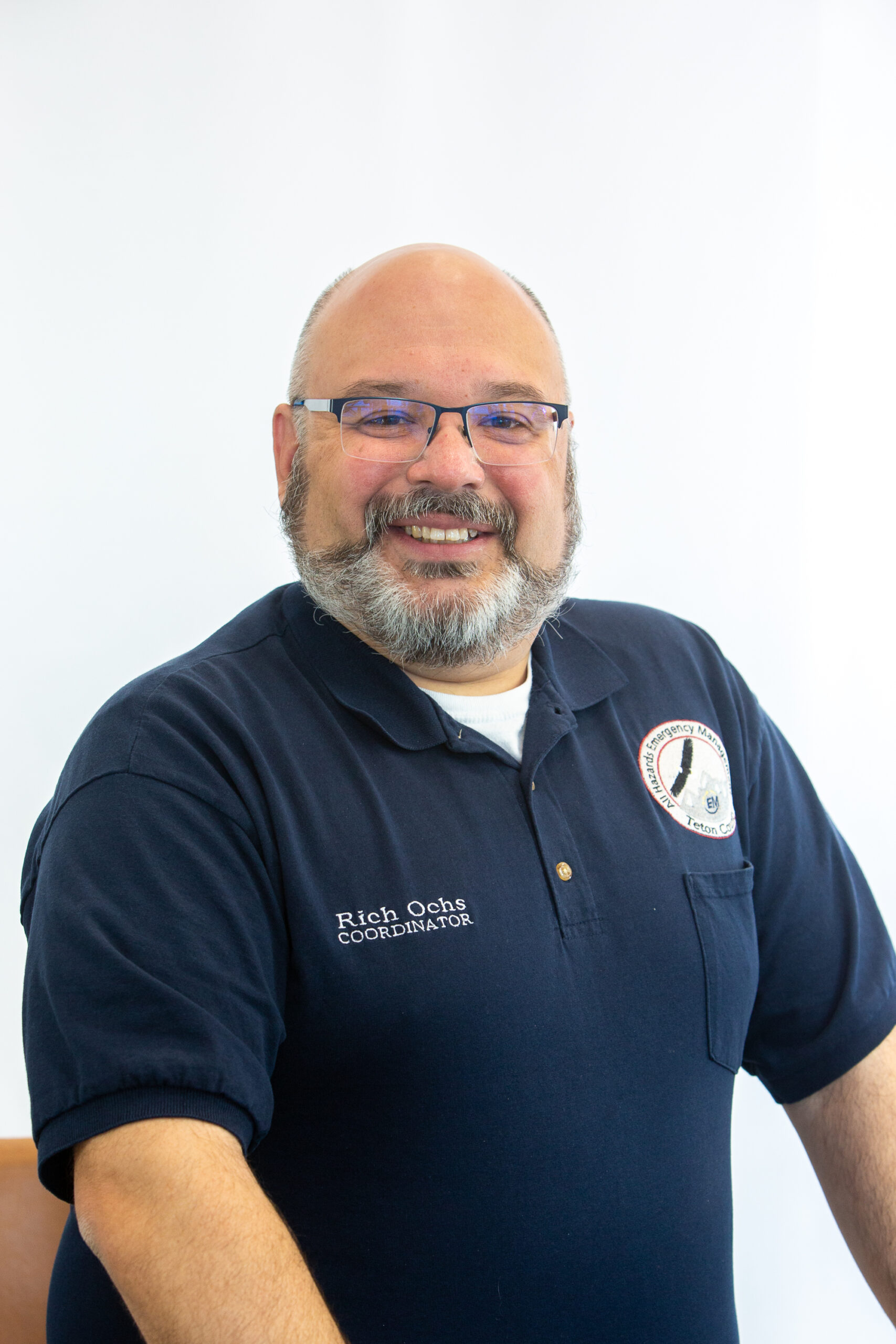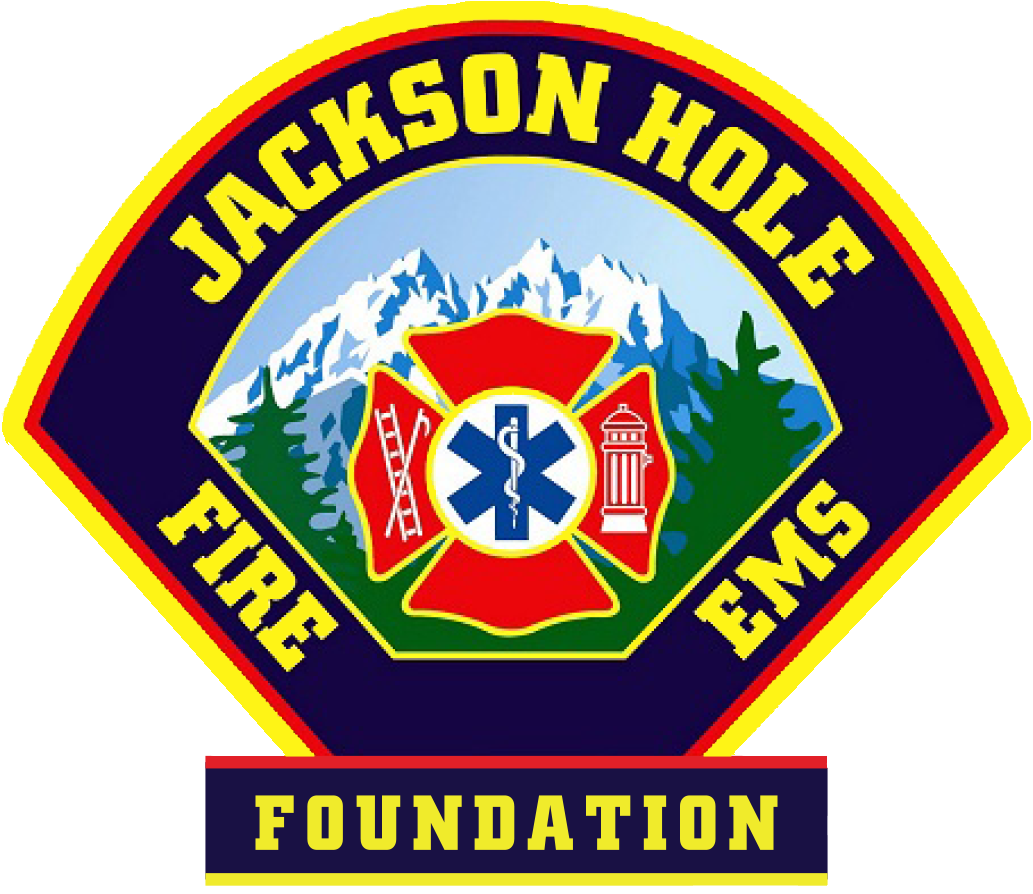
“I really feel like we have a lot of people that are very dedicated to the job, like I don’t think anyone gets into it to get rich and it’s not easy and it’s stressful. There’s a calling, there’s a reason that attracts people to wanting to help other people in the community.”
Rich Ochs
Rich Ochs
Coordinator, Emergency Management
Present
Where are you from? I am originally from New Jersey.
How long have you been in Jackson? I graduated from Rutgers with a degree in Natural Resource Management and Forestry and I came in the summer of ‘99 as a naturalist ranger in Colter Bay and Grand Teton National Park. I went back to New Jersey that winter of ‘99/’00 and came back the next summer to work again up in Colter Bay. I spent three seasons as a naturalist ranger and I have stayed here ever since then.
How would you describe what you do? During blue sky days it’s a lot of maintaining relationships and making sure organizations in town know that we consider them a part of the bigger team so that when we do have a gray sky event, they know we’re going to be calling them and we already have that relationship established. We’re the ones that really facilitate those relationships at the end of the day. We work on bringing those folks to the table and making sure they know they don’t work in emergencies day in and day out, that we’re responsible for holding their hands and bringing them through that process when the day comes. They might not understand how the Incident Command System and the Fire Department and Sheriff’s Office work, but they need to be a trusted partner and part of that emergency response team. If the trust isn’t there, it can cause issues with sharing information which can definitely have an impact in the long run. That’s a big problem. Overall, we are just trying to build rapport.
What is the EOC and what are its services? Emergency management is a division of Jackson Hole Fire/EMS. We’re a division of two people, and our primary responsibility is the disaster preparedness response, recovery, and mitigation for the county. We’re really on the planning and coordination side of managing a disaster and large scale emergencies. Here’s one way that we sometimes explain it to officials: the fire department, sheriff’s office, TCSAR, police: they’re crisis management. Car crashes? You want cops and firefighters and paramedics. You definitely do not want an emergency manager there. We can only fill out paperwork and emails. First responders are involved in crisis management, whereas emergency management is consequence management. Here’s a good example: there is a wildfire approaching the community. It will be an immediate crisis if people aren’t evacuated from the path of the fire: they can lose their lives. Take the Saddle Butte Fire, for instance. After the fire department and sheriff’s office evacuates people, they don’t care what happens to them. Not that they don’t care….it’s that it’s not their responsibility in the face of the crisis itself. Now that life safety is taken care of, they can deal with property preservation, but now we have all these people who are displaced and need a place to go. Clothes, crisis counseling, etc. That’s where the EOC steps in. We’re responsible for activating and carrying out the county’s emergency response plan. During blue sky days, we work on maintaining relationships but during a big disaster we work on calling in all these relationships to help provide counseling, food, housing, whatever those displaced and affected folks need.
We would also work with FEMA and homeland security to bring in individual and public assistance from FEMA during a large emergency. Another great example would be working with the health department during COVID and some of the public health orders that were put in place. What are the consequences of that? How do folks get food? Tell someone they can’t go out for two weeks….now what? We worked a lot with Fine Dining Restaurant Group, Whole Food Rescue, etc. during that time to help find ways to better deal with the consequences of that pandemic.
What would you like the public to know about your job or about the EOC? I would probably point out that there are people at an incident who are in charge of command elements; they set up the ICS structure. Those are the people who are definitively in charge. Emergency management is more of a coordination function in those instances: rarely, if ever, are we in charge of anything. The state statute essentially gives me a lot of responsibility with no authority. So I have a lot of things that I have to do with no actual authority for me to do any of it. I can’t force anyone to be part of the planning process, but that’s one thing I love about this job: we aren’t forcing anyone to do anything. We are working with people who want to be there during an emergency and want to protect the community, and it really forces us to think creatively. How are we best going to bring people together? It’s definitely challenging but it’s so rewarding.
What is your favorite part of your job? I would say that my favorite is consensus building and coming up with creative ways to be a part of the process of planning for emergencies and disasters.
What about the most challenging part? I don’t think anyone in the county is underworked, but the more FEMA trainings you go to, the more you realize you need to do; there’s just not enough time in a day. I would love to do more public outreach, but again…there’s just not enough time in a day. Prioritizing what aspects to focus on with limited resources.
What do you do in your free time? I’m not a person to take big vacations or anything but I try to have a balance between work and home. I try to make a point to not check emails after-hours. No one that needs emergency help is going to send an email, so I definitely try to remember that in my off hours. In the summer, I love fly fishing. Pretty much every weekend I’ll go out somewhere, and I’m not going to disclose any locations, but I love being out fishing. I like playing disc golf. In the winters, I don’t do too much: I used to snowboard but it got too expensive. I’m actually a big board game fan. I love playing strategy board games and I have a group of friends that enjoy doing that together. I also love hitting microbrew festivals anywhere. I do like beer tastings and things like that.
Do you have a favorite game? If we get really esoteric: I have a personal collection of about 200 board games, so picking a favorite is very hard. There are some war strategy games that I like…one is called, fittingly, Pandemic, that we could say is one that is one of our favorites. You play as a team to defeat a bunch of diseases trying to take over the world. It’s an interesting one because it’s a team effort; everyone is against the game. It’s kind of like in my regular job, and that’s how we play the game.
What would you say is the most valuable trait for someone to have working in emergency services? I would say the ability to set boundaries. I really feel like we have a lot of people that are very dedicated to the job, like I don’t think anyone gets into it to get rich and it’s not easy and it’s stressful. There’s a calling, there’s a reason that attracts people to wanting to help other people in the community. But because of that, I think it could become too big a part of your identity, so it can be really hard for people to disengage when it’s time to disengage while at home or not on duty. Especially because the possibility of a recall is always possible. Take care of yourself and your family so that you can be a part of the emergency services family for a long time. It has to be part of a bigger identity than just the job because it can end up leading to burnout and stress and some of the really terrible things we see that happen to folks when they center their life around being a caregiver to other people.
